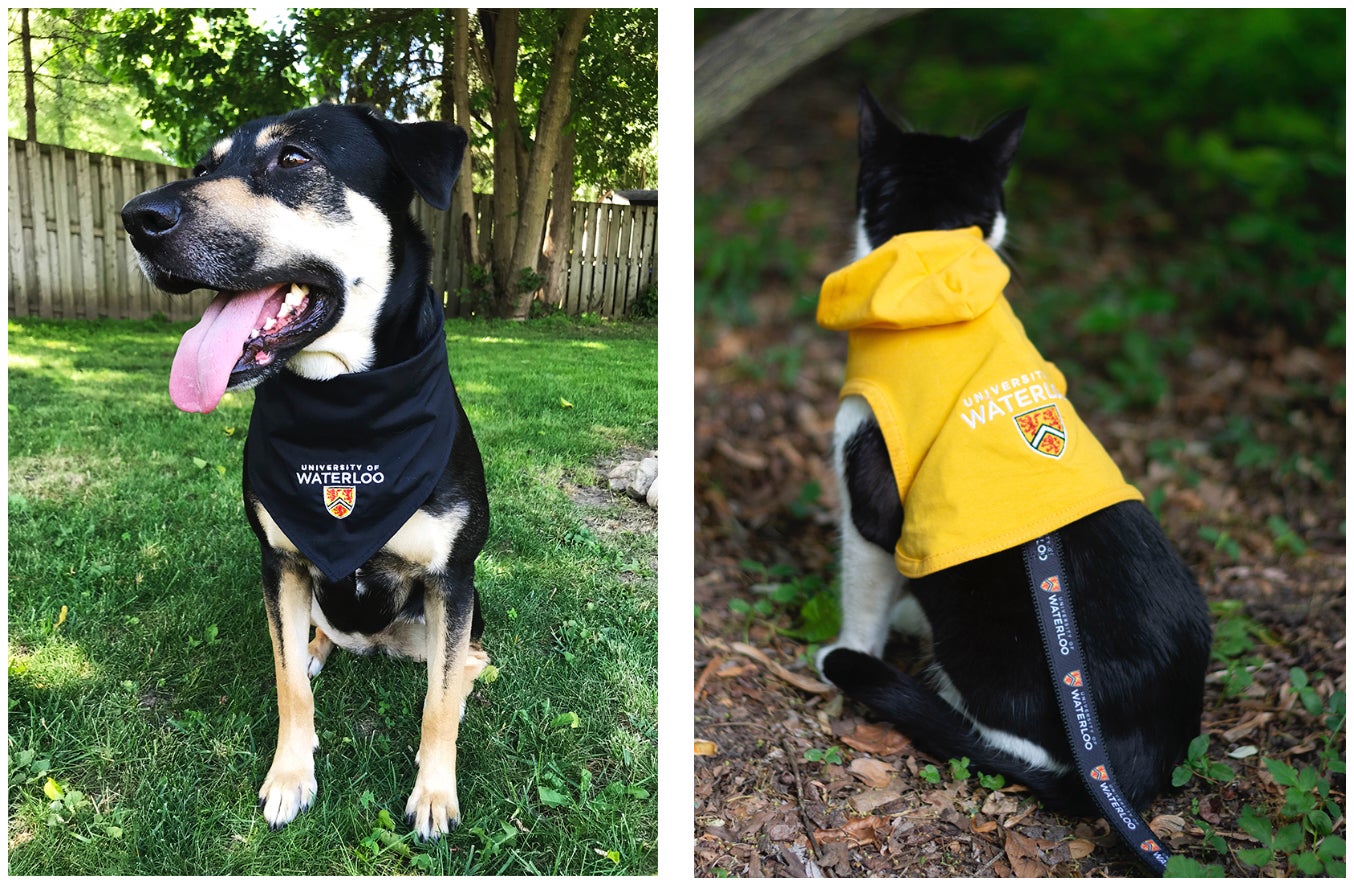Editor:
Brandon Sweet
University Communications
bulletin@uwaterloo.ca
W Store launches UWaterloo pet collection

A message from W Store.
Over the past few months, we’ve been (virtually) introduced to many of the Good Buddies of the University. We’ve heard all about how our four-legged friends have helped UWaterloo staff and faculty adjust to working remotely during the early phases of lockdown. It seems only fair to recognize these Good Buddies as honorary members of the UWaterloo campus community with some UWaterloo swag of their own.
Now you and your good buddies can rep your UWaterloo pride together with the brand new UWaterloo pet collection. The collection includes UWaterloo-crested pet bandanas, hoodies, tee shirts, leashes and collars. There’s even a UWaterloo Alumni leash option for those who want to flaunt their status as UWaterloo alumni during their next neighbourhood walk.
Shop the UWaterloo pet collection now: https://bit.ly/UWaterlooPets.
Engaging your newly remote workforce

By Leslie Berger-Associate Professor Lazaridis School of Business and Economics, Wilfrid Laurier University, and Adam Presslee-Assistant Professor School of Accounting and Finance, University of Waterloo. This article was originally published on the School of Accounting and Finance website.
The COVID-19 pandemic has transformed many workplaces from bustling offices with shared work spaces to remote, telecommuting networks. Employees around the world now find themselves working in isolation away from the familiarity of their colleagues and their workplace. This unplanned, but profound, shift in job design can have detrimental effects on employee engagement.
Employee engagement is the level of physical, cognitive and emotional energy workers dedicate towards their job and company. Engaged employees are passionate about their work, which has an acute effect on their productivity. In this article, we explore the psychology behind employee engagement, discusswhy newly remote working can have a detrimental effect on employee engagement, and provide some ways in which organizations are actively addressing this engagement issue.
What is Employee Engagement?
Employee engagement happens when employees perceive three fundamental attributes about their work: meaningfulness, safety, and control.
Employees assess the meaningfulness of their work by considering what they get in return (both financial and non-financial) for their job-related efforts. Engaged employees tend to believe their hard work makes a difference and that their efforts are not taken for granted by their company.
Employees desire safety wherein they can trust their co-workers, their boss, and their workplace. A consistent, nonthreatening environment provides employees with a clear understanding of what is expected from them.
Employees desire control wherein they have the necessary resources to do their job to the best of their ability. Importantly, resources in this context are not limited to the physical resources that companies provide their employees such as technology and equipment. Rather, resources more broadly include other aspects of the job such as the autonomy and the time.
While individual employees may not desire these three attributes to the same extent, typically organizations that offer more meaningful work where employees have a greater sense of safety and control over work related outcomes experience greater employee engagement.
The risk of disengagement in the newly remote workforce
Managers of newly remote employees face particularly unique challenges relating to employee engagement. While working remotely can increase employees’ autonomy and sense of control, it also leads to a dramatic decrease in meaningfulness and sense of security. This decrease results from changes to the structure of their job and the social isolation caused by the pandemic. Further, employees are accustomed to working in the office beside their colleagues and managers, and the physical distance caused by working remotely can develop into a psychological distance between the employee and the company, which creates significant declines in employee engagement.
Ways to foster engagement in a newly remote workforce
- Keep a long-term vision. Working from home creates many obstacles that simply don’t exist in a workplace. Be patient and understanding of family challenges, connectivity limitations and other issues that arise in a remote working environment. Managers should avoid a myopic focus on short-term productivity decreases, as negative feedback may have lasting implications in terms of employee engagement over the long term.
- Be available to provide informal feedback and encouragement. The workplace once offered many opportunities for employees to bump into other employees. This informal interaction is important for employees to establish psychological proximity to their work. To ensure that these interactions continue employers should create opportunities for virtual coffee breaks to provide employees an opportunity to informally connect with one another. Further, regular and consistent communication informing employees of the status of projects and joint outcomes serve to remind them that they are part of a team.
- Continue to reward and recognize employees. Rewards and recognition for good work are shown to have profound impact on employee engagement. However, the constraints of a remote working environment result in limited opportunities to provide employees that go above and beyond with those rewards and recognition. In the current environment, rewarding employees with tickets to the basketball game, lunch at a nice restaurant or even a cruise are not necessarily feasible or even desired. Instead, consider rewarding employees with cash, small-dollar electronic gift certificates, or even a donation to the charity of their choice. While financial rewards during this difficult time may seem counter-intuitive, such rewards when tied to performance can greatly improve productivity and firm performance. When providing these financial rewards, do not miss out on the opportunity to include words of encouragement and thanks, which are shown to positively affect engagement. For instance, personal emails to recognize employees’ efforts are shown to be highly effective.
Leslie Berger (lberger@wlu.ca) is an associate professor at the Lazaridis School of Business and Economics, Wilfrid Laurier University. Adam Presslee (capressl@uwaterloo.ca) is an assistant professor at the School of Accounting and Finance, University of Waterloo. Leslie and Adam’s research is in the area of performance management with a particular interest in understanding workplace factors that affect employee engagement and effort.
Remembering Professor Emeritus Peter Ponzo
This article was originally published on the Applied Mathematics website.
We are sad to share the news that Peter Ponzo passed away peacefully on July 5, 2020 after a battle with bone cancer.
 Peter became an Assistant Professor at the University of Waterloo in 1964. Peter was known for his ability to make calculus so simple and logical. “His lectures were something to behold,” said Ron Dunkley, once Associate Dean of the Faculty of Mathematics. “He was a fabulous teacher with a beautiful way of expressing calculus.”
Peter became an Assistant Professor at the University of Waterloo in 1964. Peter was known for his ability to make calculus so simple and logical. “His lectures were something to behold,” said Ron Dunkley, once Associate Dean of the Faculty of Mathematics. “He was a fabulous teacher with a beautiful way of expressing calculus.”
When Mathematics became a Faculty in 1968, Peter was named chair of the Department of Applied Mathematics. He later became the Associate Dean of the Faculty of Mathematics. He retired after 30 years of teaching with the distinction of Professor Emeritus.
“Peter wrote one of the first papers on a mathematical model of tumour growth…before the whole field became fashionable(!),” recalled Siv Sivaloganathan, chair of the department. “He will be greatly missed by those that knew him.”
Peter authored a book to celebrate the first 25 years of computer science at the University of Waterloo. Distinguished Professor Emeritus Don Cowan, the founding chair of the computer science department, now known as the David R. Cheriton School of Computer Science and Wes Graham asked Peter to write the book.
“Peter was incredibly talented. He was a writer, artist, gifted educator, researcher and wonderful collaborator,” remembered Cowan. “As an educator, he had the ability to communicate ideas to students at all educational levels. As a collaborator, he always worked for the common good of all involved. Peter had a wonderful sense of humour, which he expressed in both the written word and his cartoons. Peter will be missed very much by all who knew and worked with him.”
Peter also authored a book about the origins of math contests in 1995. Today, the Centre for Education in Mathematics and Computing (CEMC) runs the contests and holds outreach programs through the year, but back then Peter was heavily involved in running the contests and taught calculus to high school students attending the Summer Seminars at Dunkley’s request.
Following his retirement, Peter wrote novels, educational pieces about calculus and losing money in the stock market, and a blog, in addition to camping, cruising and spending time with his children and grandchildren. The Globe & Mail published a piece about Peter’s tests of investing formulas and strategies as he managed his own retirement savings. He took his learning and created a large number of tutorials known as gummy-stuff.
In lieu of flowers, donations in his memory can be made to the Peter Ponzo Memorial Fund. You can find more details in his obituary.
Professor joins collaborative 'Yugosplaining' project

Bojana Videkanić, Iztranzicionisana/Iztranzicionirana/Transitioned Out, multimedia project, 2016-2020. Image credits: Bojan Stojšić.
Waterloo Fine Arts Professor Bojana Videkanic has co-authored a visual essay in collaboration with several other artists from the former Yugoslavia as part of an international project that critically examines that country's dissolution into a number of independent successor states in the 1990s and early 2000s.
Entitled "Yugosplaining the World", the series, hosted by The Disorder of Things, will feature essays and artworks by more than 20 ex-Yugoslav diasporic scholars, writers, and artists. The essays are, in Professor Videkanic's words, "meant to counter the 'westernsplaining' to which we have long been subjected."
Videkanic's visual essay is entitled “Thinking and Doing in Between.” One of the artists featured in the visual essay series is Fine Arts alumnus Žana Kozomora (BA’15), a student of Videkanic's.
The essays are being posted daily until July 21, with the exception of July 11, which marked the 25th anniversary of the Srebrenica genocide.
Link of the day
When and Where to get support
Students can visit the Student Success Office online for supports including academic development, international student resources, leadership development, exchange and study abroad, and opportunities to get involved.
Instructors can visit the Keep Learning website to get support on adapting their teaching and learning plans for an online environment. The following workshops are current offerings from the KL team (CTE, CEL, ITMS, LIB):
Getting Ready to Facilitate Online Courses: TA Training, beginning July 13.
Introduction to OER Data & Simulations,Thursday, July 16, 11:00 to 11:30 a.m.
Fostering Student Engagement Online: Examples and Tips, Thursday, July 16, 2:00 p.m.
Beyond the Final Exam, Friday, July 17, 1:30 p.m.
Employees can access resources to help them work remotely, including managing University records and privacy of personal information
Interested in learning more about engaging your students in an online course? The Centre for Extended Learning has created a new resource for you called "Fostering Engagement: Facilitating Online Courses in Higher Education"
ThisOpen Educational Resource was designed for post-secondary instructors and teaching assistants who would like to better understand the critical role of facilitation in online course delivery, and build practical skills and strategies that are relevant, effective, and authentic.
Here are some tips for staying healthy while working from home.
The Writing and Communication Centre has gone virtual. We have many online services to help you meet your goals, including: Virtual Pre-booked and Drop-in appointments, Online workshops, Virtual Grad and Faculty Writing Cafés, Instagram Live Q&A sessions, Live PJ-Friendly Write-ins, Online learning resources, and Online programming for Master’s and PhD students. Whatever you’re working on, we’re here to help! Visit our website for more information.
We understand that these circumstances can be troubling, and you may need to speak with someone for emotional support. Good2Talk is a post-secondary student helpline based in Ontario, Canada that is available to all students.
If you feel overwhelmed or anxious and need to talk to somebody, please contact the University’s Campus Wellness services, either Health Services or Counselling Services.
The Library has published a resource guide on how to avoid information overload.
The Faculty Association of the University of Waterloo (FAUW) continues to advocate for its members. Check out the FAUW blog for more information.
The University of Waterloo Staff Association (UWSA) continues to advocate for its members. Check out the UWSA blog for more information.
WUSA supports for students:
Food Support Service food hampers are currently available from the Turnkey Desk on weekdays from 9:00 a.m. to 4:00 p.m. in the Student Life Centre. If you have any questions please email us at foodsupport@wusa.ca.
MATES – Providing general online Peer Support via Skype to undergraduate students. To set up an appointment, please go to: https://wusa.ca/peersupport
Glow Centre - Providing online Peer Support for the LGBTQ2+ community via Skype to Undergraduate students. To set up an appointment, please go to: https://wusa.ca/peersupport
The Women’s Centre– Providing online Peer Support via Skype to undergraduate students. To set up an appointment, please go to: https://wusa.ca/peersupport
RAISE– Providing online Peer Support via Google to undergraduate students. To set up an appointment, please go to: https://wusa.ca/peersupport
The Bike Centre – Now open by appointment for your bicycle repair and rental needs in the Student Life Centre. For more information or to schedule an appointment, please go to: https://wusa.ca/bikecentre
Centre for Academic Policy Support - CAPS is here to assist Waterloo undergraduates throughout their experience in navigating academic policy in the instances of filing petitions, grievances and appeals. Please contact them at caps@wusa.ca . More information at http://wusa.ca/caps
WUSA Commissioners who can help in a variety of areas that students may be experiencing during this time:
- Equity – equity@wusa.ca
- Co-op and Experiential Affairs – coop.affairs@wusa.ca
WUSA Student Legal Protection Program- Seeking legal counsel can be intimidating, especially if it’s your first time facing a legal issue. The legal assistance helpline provides quick access to legal advice in any area of law, including criminal. Just call 1-833-202-4571.
Empower Me is a confidential mental health and wellness service that connects students with qualified counsellors 24/7. They can be reached at 1-844-741-6389.
When and Where (but mostly when)
Warriors Coaching Clinics. Every Wednesday from June 3 to July 15. Free online sessions highlighting a wide range of topics featuring Warriors Coaches and staff. Register in advance for the zoom link.
Healthy Warriors at Home. Free programming including Online Fitness, Personal Training, Health Webinars, Personalized Nutrition and more. Open to students, staff, faculty and alumni. Register today.
Waterloo Warriors Online Camps. Online youth experiences including basketball, hockey and multi-sport camps for a variety of ages. Starting at $48.00/week. Register today.
Warriors Big 6 Summer Challenge. Weekly challenges from July 13-August 23 focusing on Movement, Sleep, Hydration, Nutrition, Apps and Choose your own adventure. Post your photo and tag @WlooRec on Instagram for a chance to win a $100 box from truLOCAL each week as well as $100 from Mel’s Diner for our grand prize winner. Stay healthy Warriors!
Indigenous Perspectives in STEM with Dr. Veselin Jungic, Thursday, July 16, 1:00 p.m.
De-escalating Difficult Student Situations for Faculty and Staff, Thursday, July 16, 1:30 p.m., Microsoft Teams – Register on GoSignMeUp.
Grammar studio III: Clarity at the sentence level, Thursday, July 16, 2:00 p.m., Live Q & A on LEARN.
Healthy Minds, Creative Concepts: All About Sleep, Thursday, July 16, 4:00 p.m., Virtual Event.
IT Seminar: Service Desk and Jira, Friday, July 17, 9:00 a.m. to 9:45 a.m. Join online.
INI202: You Don't Know What You Don't Know Part II, the second part of a two-part workshop where campus community members gain a deeper understanding of historic and current realities for First Nations, Métis and Inuit people in Ontario and Canada, Friday, July 17, 1:00 p.m. to 4:00 p.m.
Clarity in scientific writing, Monday, July 20, 2020, 1:00 p.m., Live Q & A on LEARN.
NEW - AHS Live Chat, Tuesday, July 21, 11:00 a.m. to 12:00 p.m.
NEW - Akindi Live Training (Webinar), Wednesday, July 22, from 1:00 p.m. to 1:45 p.m.
NEW - Say it in your own words: Paraphrase & summary for graduate students, Thursday, July 23, 9:00 a.m., Live Q & A on LEARN.
NEW - New Faculty Online Social, Wednesday, July 23, 2:30 p.m.
PhD oral defences
Pure Mathematics. Ehsaan Hossain, "Recurrence in Algebraic Dynamics." Supervisor, Jason Bell. Thesis available from MGO - mgo@uwaterloo.ca. Oral defence Tuesday, July 21, 10:00 a.m.
English Language and Literature. Houman Mehrabian, "“Ill Schooled in Bolted Language”: Shakespeare’s Tragic Flaw." Supervisor, Michael MacDonald. Thesis available upon request from the Faculty of Arts Administrative Coordinator, Graduate and Research. Oral defence Tuesday, July 21, 1:00 p.m.
Applied Mathematics. Matthew Harris, "The Instability of Geophysical Flows: Two-layer Frontal Instabilities and Continuously Stratified Centrifugal Instabilities." Supervisors, Francis Poulin, Kevin Lamb. Thesis available from MGO - mgo@uwaterloo.ca. Oral defence Wednesday, July 22, 9:00 a.m.
Computer Science. Anastasia Kuzminykh, "Contextual Factors Affecting Information Sharing Patterns in Technology Mediated Communication." Supervisor, Edward Lank. Thesis available from MGO - mgo@uwaterloo.ca. Oral defence Thursday, July 23, 1:00 p.m.